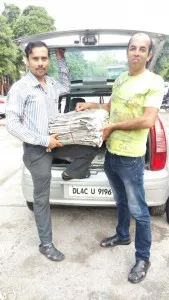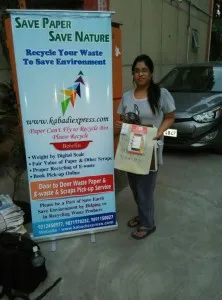Kabadi Express - Helping People Recycle Paper and Get Paid For Doing It
India recycles only about 20% of its waste paper. Though a bulk of the 80% of waste paper goes into “Indian” lifestyle aspects like wrapping, packing, etc., they eventually end up in dumping grounds. With the growing demand, we continue to axe more and more trees – the current demand of 10 million tonnes annually is projected to more than double by 2025.
Kapil Bajaj and Sandeep Sethi are set to solve this problem. With a career spanning 15 years in IT and financial markets, they started Kabadi Express in early 2015.
At your doorstep
With the current state of recycling, for making new paper we need to cut the trees in big numbers or import waste paper from other countries. It’s a very dangerous situation for our environment and natural resources. A single household in India wastes close to 100 kg of paper every year. This made us feel we must educate people to not waste papers and in turn do our bit in saving the trees
says Kapil Bajaj. The duo registered the domain, and kicked off with their web footprint a year and a half back. They surveyed the market and understood the thought process of customers. Having started their operations 4 months back, they are currently in East Delhi.

Kabadi Express connects with housing societies and introduces their services to the president and other office members. They then distribute a bag to each household which can pack upto 15 kg waste paper. Whenever the bag is full, the costumer gives Kabadi Express a call; someone from the Kabadi Express team goes and collects it. To ensure transparency, they use a digital scale. To take it a step further they send a receipt of the collection to the customer and send an sms that thanks the customer for doing their bit towards tree and nature conservation.The main purpose of distributing a bag is to unconsciously make it a habit among customers – just like a dustbin encourages collecting waste and not littering, Kapil hopes that the bag will help people inculcate the habit of collecting recyclable paper.
The Business of Collecting Waste Paper
They collect the paper from costumers at competitive market rates and sell it directly to the mills. “We pay the customer Rs.10 a kg and the recycling mill gives us Rs. 13.50 a kg”. The model is targeted at removing redundancy in the value chain, created by middlemen, and thereby get a larger share of the margin.

Kapil tells us that this is not their main source of revenue, “We bring revenue in by advertising on bags, it gives the companies visibility and us, the revenue to expand.” He also tells us what makes Kabadi Express different from other recycling based startups. “We at Kabadi differentiate ourselves from the competition by distributing the bags and interacting with the costumer directly, and in the process educating them about recycling and the customer’s contribution towards a larger cause”.In the 4 months of operations, Kabadi Express has created a 2000 strong customer base through word of mouth publicity. In the next 6 months they intend to expand their operations to Ghaziabad, followed by Rohini and Dwarka.
Does this infringe on the livelihood of kabadiwaalas?
“No, we are not killing livelihood of those kabadiwaalas,” says Kapil, “In fact, we are in touch with local kabadiwaalas to connect with us and we are ready to educate them and give them more earnings through our channel”. Kapil adds, “However, the ground reality is that they are not ready to work with Kabadi Express because they’re reluctant to adapt newer and more transparent methods of weighing and pricing.” Kapil expects this trend to change soon, as they see value being built by Kabadi Express.
In the current scenario, there are no options for the customers, other than these local vendors who do not use standard weighing and pricing policies. Kabadi Express’s current focus is on solving this issue and providing a good customer experience. Integration of kabadiwaalas will hopefully follow soon.
Related Read:
Encouraging literacy, recycling, and an eco-friendly society all in one go – Used2Useful’s story
Kabadiwalla Connect: Bringing efficiencies into waste segregation, recycling







